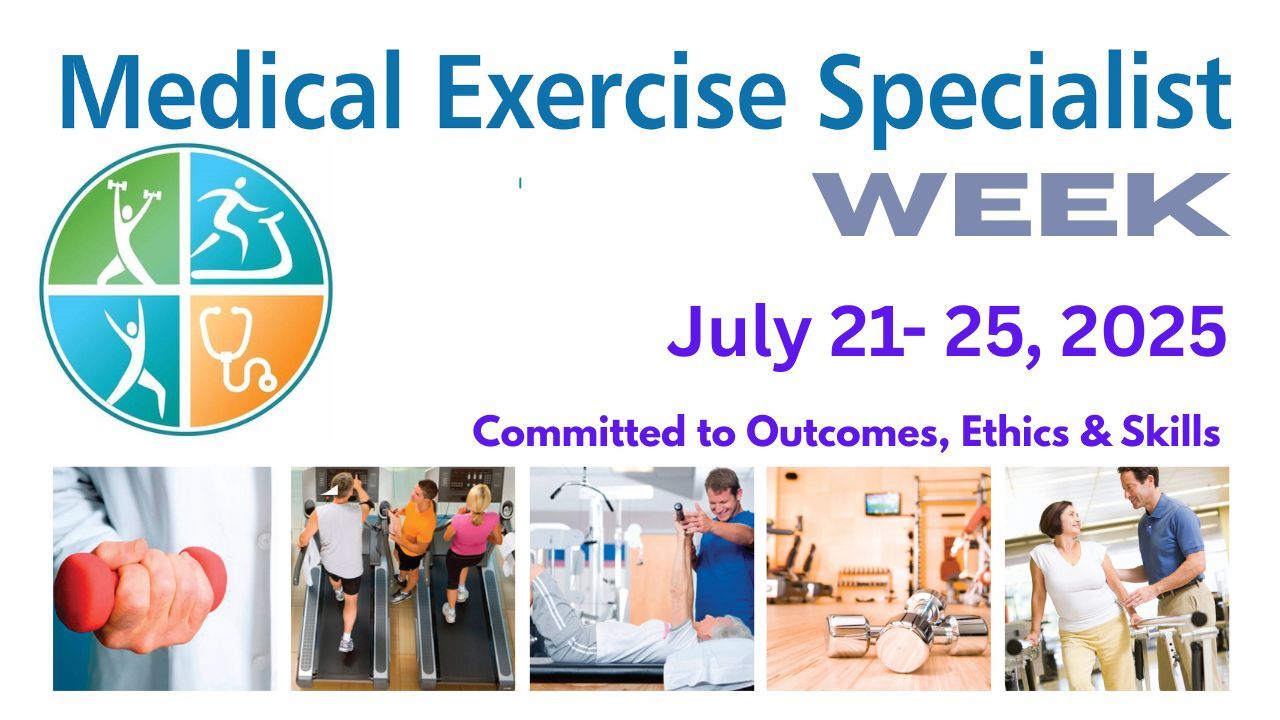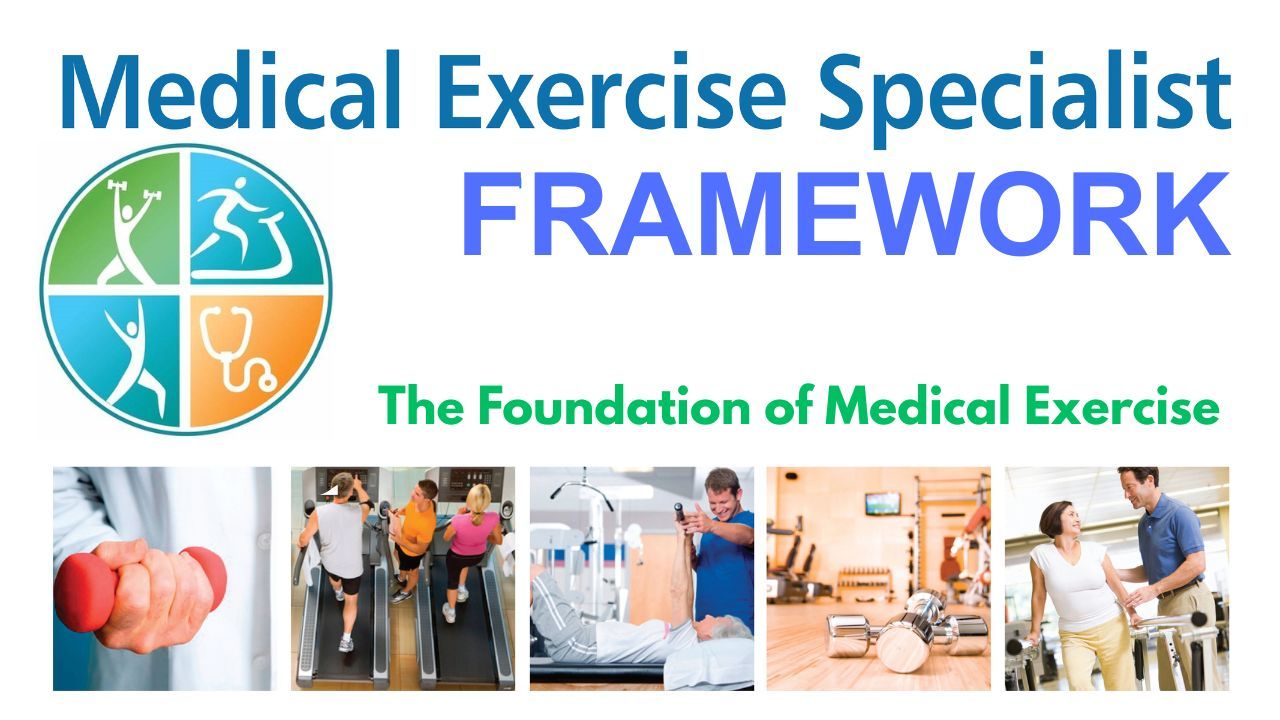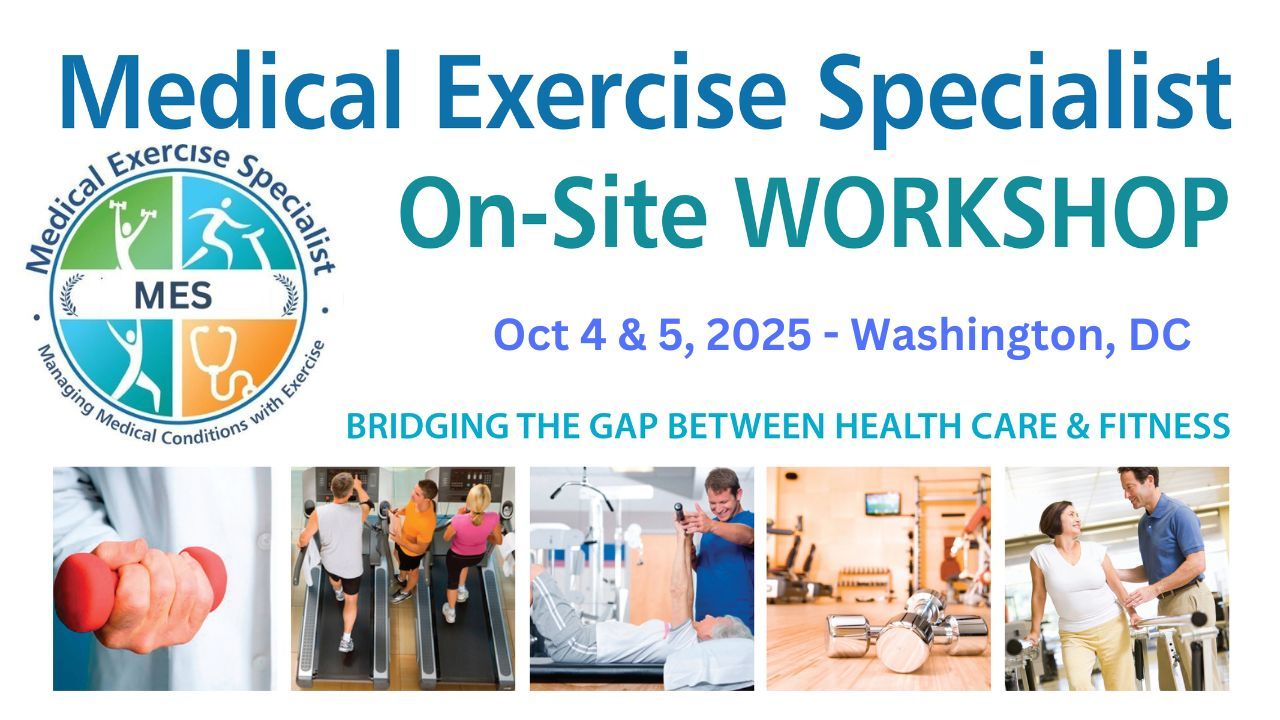🎉 Welcome to Medical Exercise Specialist Week – July 21–25! 🎉

This week, we proudly celebrate 31 years since the very first Medical Exercise Specialist Workshop, held in July 1994—marking the beginning of a global movement that has changed lives, built careers, and bridged the gap between healthcare and fitness like never before.
Medical Exercise Specialist Week is all about YOU—the dedicated MedExPROs around the world who are restoring function, rebuilding confidence, and producing real outcomes for clients every single day.
Throughout the week, we’ll be sharing inspiring MES success stories from across the globe, giving you tools and resources to grow your practice, build lasting referral relationships with medical professionals, and dive deeper into the MES Framework—the foundation for our profession’s standards and growth.
We’ll also reveal the future vision of Medical Exercise Training—a profession with ethics, recognition, and outcomes at its core.
So whether you’ve been with us since 1994 or you’re just joining the movement, this week ...
The MES Framework: Our Future Starts Now

Celebrating 31 Years of Progress by Launching the Professional Standard for MedExPROs
Happy MES Week! As we commemorate the 31st Anniversary of the first Medical Exercise Specialist (MES) Workshop in 1994, it’s a perfect time to reflect on the cornerstone of our profession: the Medical Exercise Specialist (MES) Framework. This framework is not merely a set of guidelines; it's an indispensable roadmap, essential for every Medical Exercise Professional (MedExPRO) striving to establish professional standards and deliver unparalleled outcomes for our clients.
The need for Medical Exercise Training (MET) has never been greater, driven by an aging population, the prevalence of chronic diseases, and the medical community's growing recognition of exercise as a "magic elixir" for managing these conditions. The MES Framework provides a structured and systematic approach for fitness professionals to effectively work with individuals who have medical conditions, guiding MedExPROs through their r...
Medical Exercise Specialist: From 14 Pioneers to 6 Continents
A Milestone 31 Years in the Making
On July 18, 1994, 14 forward-thinking fitness professionals gathered for something the industry had never seen: the first Medical Exercise Specialist (MES) Workshop and Certification. We spent a week—laying down MES systems, language, documentation standards, and exercise programming models for working with clients after rehab. We didn’t know it then, but we were launching a profession.
Today, many of those original 14 Medical Exercise Specialists are still actively practicing—still changing lives, still setting the bar for professionalism, and still proving that properly applied exercise changes function, health, and quality of life.
From One Workshop to a Global Profession
That first course laid the foundation for what is now the Medical Exercise Training Institute (METI) and the global Medical Exercise Specialist movement. Three decades later, Medical Exercise Specialists are practicing on six continents, collaborating with physicians, physical...
MET 101 Tip #39: Build Your Practice by Knowing the Right Certification Path
In Medical Exercise Training 101 eBook - Tip #39, Dr. Mike breaks down the evolution of medical exercise certifications and how each one plays a critical role in helping fitness professionals transition into respected medical exercise professionals. He emphasizes that certification isn’t just about letters after your name—it’s about building a system that bridges fitness and healthcare.
Dr. Mike walks us through the four cornerstone certifications:
- Medical Exercise Specialist (MES) – The gold standard since 1994, this certification is deep and rigorous, focusing on assessment, documentation, and business systems.
- Postrehab Conditioning Specialist (PRCS) – A powerful entry-level option introduced in 1998, ideal for professionals getting started with medically based clients.
- Medical Exercise Program Director (MEPD) – For those leading facilities or departments, this cert includes advanced topics like pharmacology, communication systems, and managing full MET programs.
- Advanced Med...
The MedExPRO Referral Ignition Kit Is BIGGER… and More Powerful
Dear MedExPRO,
You’ve taken the time to build your skills. You’re ready to serve clients. But are you missing the final piece?
✅ Consistent, qualified referrals from trusted medical professionals.
If you’ve ever wondered what to say in your introduction letter, how to follow up with a physician, or how to present yourself as a credible partner in a client’s continuum of care—this is for you.
Introducing the newly expanded MedExPRO Referral Ignition Kit – now with 49 powerhouse tools, scripts, templates, and resources to help you attract referrals, communicate clearly, and grow your practice with confidence.
This isn’t fluff. These are real-world, field-tested resources that MedExPROs are using RIGHT NOW to land referrals, build relationships, and establish authority with physicians, physical therapists, chiropractors, and more.
💥 What’s Inside the Referral Ignition Kit?
📝 20+ Customizable Communication Templates
→ Introductory, follow-up, and thank-you letters to MDs, PTs, DCs, ...
The Last Medical Exercise Specialist Onsite Workshop - Washington, DC - October 4 & 5, 2025

🔥 If you’re a Medical Exercise Professional looking to sharpen your skills, deepen your confidence, and master the application of medical exercise — clear your calendar for October 4 - 5, 2025.
Because something monumental is happening in Washington, DC — and it’s the kind of opportunity that comes once in a lifetime.
🚨 This Is It: Dr. Mike’s Final MES Onsite Workshop
After 31 years of empowering professionals, transforming practices, and helping build the global standard for post-rehab exercise training, Dr. Mike will teach his final onsite Medical Exercise Specialist (MES) Workshop in 2025 in Washington, DC where it all started in July 1994.
This isn’t just a workshop — it’s the culmination of decades of knowledge, refined into a high-impact, hands-on weekend experience.
💡 What Makes This Workshop So Special?
This is the last in-person opportunity to apply the 54-lesson MES online training series in a fully immersive setting. Hosted in a medical exercise training studio in Was...
Days 25 - 30: Cracking the Code is Back!! Master Your Referral Outreach
We hope you had an incredibly insightful and productive experience at the recent MES Workshop in Houston! As we transition back, we're thrilled to reignite our "Cracking the Code" webinar series. Due to the workshop, we took a brief break, and now we’re combining the crucial final steps of the "30 Days to Referral Ready" challenge into one powerful, action-oriented session.
This 60-minute webinar will consolidate and clarify the essential external strategies from Days 25 through 30 of the challenge. This is your definitive guide to effectively communicating your unique value, cultivating strong relationships with healthcare providers, and establishing your position as an indispensable referral partner in the patient recovery process.
This webinar is critical because it brings together all the "go-to-market" strategies you need to transition from simply being "referral-ready" to actively receiving consistent referrals and becoming a recognized extension of the medical team.
We cover ...
Transforming Medical Exercise: The MES Workshop Houston Set a New Standard!
Setting New Standards: A Recap of the Transformative MES Workshop in Houston!
Houston was electric on June 28 & 29 as 22 dedicated MedExPROs came together for one of the most impactful MES Workshops to date—and the energy in the room was undeniable.
Led by Dr. Mike, the weekend wasn’t about ticking boxes for another certification. It was about building true competence and confidence as Medical Exercise Specialists who can step into the healthcare system with skill, structure, and clarity, managing clients with medical conditions through exercise—not guesswork.
From Personal Trainer to MedExPRO: A Mindset Shift
The workshop redefined what it means to be a MedExPRO. Instead of seeing clients as workouts, attendees learned to see them as opportunities for functional transformation—with structured assessments, precise documentation, and professional communication that physicians and therapists actually respect.
Participants practiced these skills through hands-on case work, including ...
Day 24 – Optimize Your LinkedIn Profile: Position Yourself as the Medical Exercise Professional
Your LinkedIn profile is more than just a digital resume—it’s your personal brand and professional storefront. If a doctor, case manager, or referral coordinator searches your name, your LinkedIn profile is likely one of the first things they’ll see.
That means it needs to clearly communicate who you are, what you do, and how you help—all within the scope of Medical Exercise.
Day 24 is your opportunity to clean up and elevate your LinkedIn presence so it works for you—even while you sleep.
✅ Key areas to optimize:
- Headline: Use keywords like “Medical Exercise Specialist,” “Post-Rehab Fitness Expert,” or “Functional Training for Chronic Conditions.”
- About Summary: Clearly state who you help, how you help, and the outcomes you produce—without sounding like a personal trainer.
- Experience: Highlight your MET certifications, programs offered, and any relevant work with medical professionals or special populations.
- Skills & Endorsements: Add relevant skills such as “Medical Exercise ...
Day 23 – Claim & Update Your Google Business Profile
If you haven’t claimed your Google Business Profile, potential clients—and more importantly, potential referral sources—might be seeing outdated, incomplete, or irrelevant information. Worse, they might not be seeing anything at all.
On Day 23, we're helping you take control of how your practice shows up in Google Search and Maps.
Here’s why your Google Business Profile (GBP) matters:
- It’s the first thing providers and clients see when they Google you
- It boosts your local SEO and visibility—especially for mobile searches
- It builds trust with reviews, clear hours, and accurate service listings
- It allows you to post updates and engage with your audience
✅ Here’s your checklist for today:
- Search your business name on Google
- If you haven’t claimed it, do so at google.com/business
- Update your contact info, hours, and website
- Add a professional photo or logo
- List your services clearly (keep it within MET scope)
- Begin asking satisfied clients for reviews
A fully optimize...
